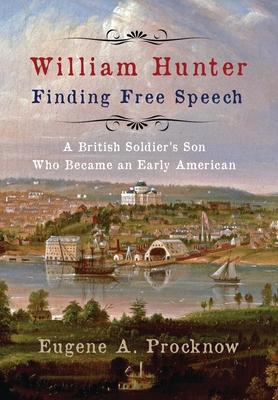William Hunter - Finding Free Speech: A British Soldier's Son Who Became an Early American

William Hunter - Finding Free Speech: A British Soldier's Son Who Became an Early American
In June 1798, President John Adams signed the now infamous Alien & Sedition Acts to suppress political dissent.
Facing imminent personal risks, a gutsy Kentucky newspaper editor ran the first editorial denouncing the law's attempt to stifle the freedom of the press.
Almost immediately, government lawyers recommended his arrest and prosecution.
That editor was William Hunter, amazingly, the son of a British soldier.
During the American Revolution, he accompanied his father on a campaign to fight the American Rebels. Witnessing first-hand the terrors of combat and twice experiencing capture, Hunter wrote the only surviving account written by a child of a British soldier during the American Revolution. Previously unknown, the journal is one of the most important document discoveries in recent years.
Remarkably immigrating to an enemy country, Hunter started the second newspaper west of the Alleghenies in Pennsylvania. Moving to Kentucky's capital, Hunter spoke his mind as a newspaper editor, took entrepreneurial risks, and helped start educational and civic institutions.
Particularly compelling, Hunter overcame two major personal setbacks that tarnished his character and left him bankrupt. Each time, he tenaciously persevered and regained prominent stature.
Later, Hunter became an elected Kentucky representative, a staunch Andrew Jackson supporter, and moved to Washington, DC, to root out fraud and waste in his administration. Beyond the well-known founders, William Hunter represents a previously underappreciated community leader who made essential contributions to developing democratic and civic institutions in Early America.
PRP: 309.69 Lei
Acesta este Prețul Recomandat de Producător. Prețul de vânzare al produsului este afișat mai jos.
278.72Lei
278.72Lei
309.69 LeiLivrare in 2-4 saptamani
Descrierea produsului
In June 1798, President John Adams signed the now infamous Alien & Sedition Acts to suppress political dissent.
Facing imminent personal risks, a gutsy Kentucky newspaper editor ran the first editorial denouncing the law's attempt to stifle the freedom of the press.
Almost immediately, government lawyers recommended his arrest and prosecution.
That editor was William Hunter, amazingly, the son of a British soldier.
During the American Revolution, he accompanied his father on a campaign to fight the American Rebels. Witnessing first-hand the terrors of combat and twice experiencing capture, Hunter wrote the only surviving account written by a child of a British soldier during the American Revolution. Previously unknown, the journal is one of the most important document discoveries in recent years.
Remarkably immigrating to an enemy country, Hunter started the second newspaper west of the Alleghenies in Pennsylvania. Moving to Kentucky's capital, Hunter spoke his mind as a newspaper editor, took entrepreneurial risks, and helped start educational and civic institutions.
Particularly compelling, Hunter overcame two major personal setbacks that tarnished his character and left him bankrupt. Each time, he tenaciously persevered and regained prominent stature.
Later, Hunter became an elected Kentucky representative, a staunch Andrew Jackson supporter, and moved to Washington, DC, to root out fraud and waste in his administration. Beyond the well-known founders, William Hunter represents a previously underappreciated community leader who made essential contributions to developing democratic and civic institutions in Early America.
Detaliile produsului










